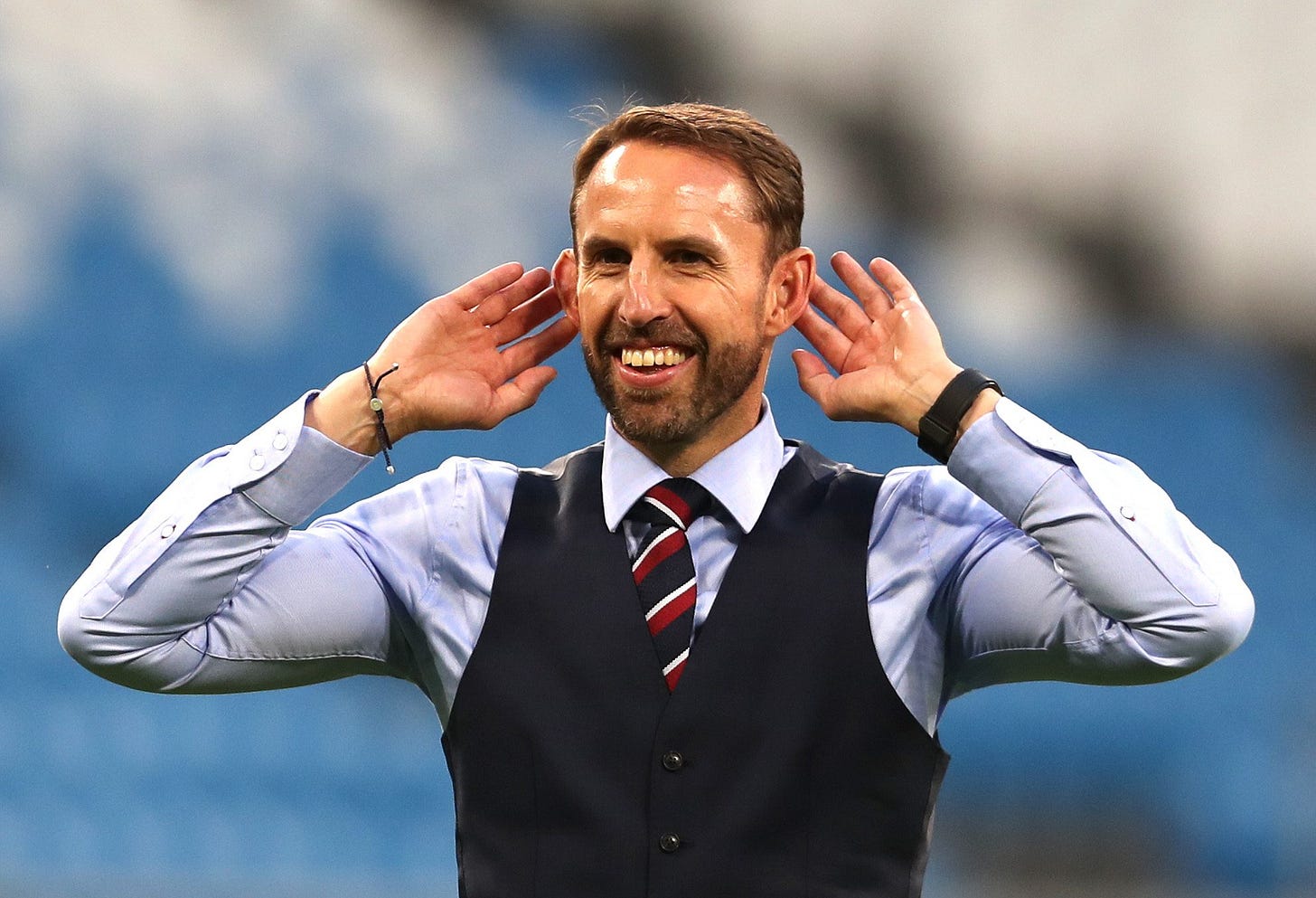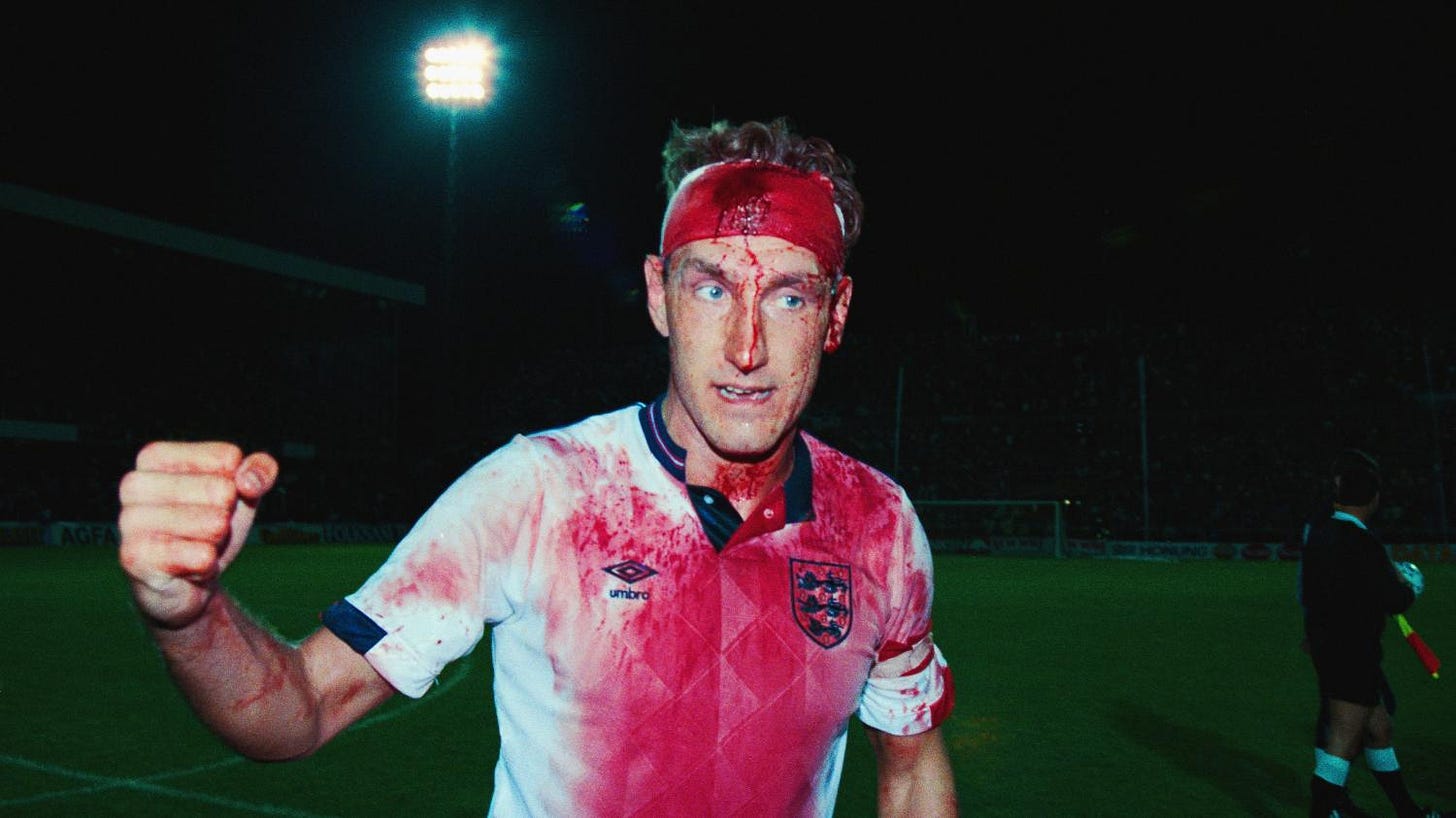Gareth Southgate, the concept of Englishness and the UK census
The Three Lions are in the midst of a golden era under their progressive manager in parallel with the FA embracing a diverse, youthful fanbase.
After a week of soul-searching following England’s World Cup exit, Gareth Southgate has reportedly decided against hanging up his M&S waistcoat.
This is fantastic news as the 52 year-old has helped redefine the England experience.
He has been the perfect figurehead of the FA’s modernisation of England, and it’s hard to think of any other candidates who could slip so easily into that role.
At a time when the rise of the Premier League has continued apace, Southgate has helped buck the trend by reigniting passion for the national team bolstered by a digital content and marketing strategy that is confident, fun and in-tune with modern culture, trends and diversity.
Moments and memes
When you think of Southgate’s time in charge of England, what are the moments and images that come to mind?
Is it this photo of Harry Maguire speaking to his then fiancee, Fern Hawkins at the 2018 World Cup after England’s first ever penalty-shootout win (against Colombia).
The picture instantly spawned thousands of memes, in that heady, scorching summer when England fans started to believe and even enjoy following the Three Lions again after ten years of mediocrity.
Or perhaps it might be the sight of Southgate, himself, serenaded at the same tournament by England fans during the Three Lions’ run to the semi-finals, with a song based on Atomic Kitten’s 2001 hit ‘Whole Again’.
You might also go for England fans, packing out Boxpark in Croydon or Wembley and showering each other in beer after a first major tournament win over Germany or the Euro2020 semi-final win against Denmark which saw England reach a major final for the first time since 1966.
My image to define the Southgate era, would be the sight of a delighted Bukayo Saka enjoying downtime between England games by larking around with an inflatable unicorn in the team’s pool.
For me it represents so much.
How Southgate used simple but inspiring methods to bring the fun back into international duty for his players.
How England became relaxed with its comms strategy during his tenure, unafraid to show players enjoying themselves and smiling.
How Southgate, a former England Under-21 manager, trusted in and empowered youth like no other England manager before him…
How this England team has come to represent a diverse, multicultural nation, typified here by Saka, born in Ealing to Yoruba Nigerian parents, who plays football with a joy and fearlessness that instantly lifts your spirits.
It’s all a world away from the years when some of the best players in the world including David Beckham, Ashley Cole, Steven Gerrard, Frank Lampard, Rio Ferdinand, John Terry and Wayne Rooney failed to deliver when it really mattered, amidst acrimony and cliques.
During my time as a journalist, I spent four years covering England, including the 2010 World Cup in South Africa, when Fabio Capello’s uninspired squad full of stars crashed out spectacularly against Germany in the round of 16 after managing just one win (against Slovenia).
The hype, the pressure, the tension, the distrust - all of it made for an unhappy camp - and the team’s relationship with the media, particularly the tabloid press - left a lot to be desired.
But England under Southgate has been a team of players completely at ease with who they are, where they come from and what they represent.
Tournament football is about creating a positive vibe, and England’s three major contests under Southgate have all seen a much improved relationship between the players and the journalists, including darts games and round tables which helped keep the content flowing.
It’s almost as if England’s comms team came to realise that if you feed journalists scraps and bland quotes you will effectively force them to look elsewhere for stories via contacts and connections, or by simply following the WAGs.
Reinventing the concept of Englishness
From a sports marketing perspective, Southgate’s time at the helm has been characterised by a repositioning of England into a place which fits much more naturally with modern, multicultural Britain.
Every team needs an identity, and England had an identity crisis for many years trying to redefine itself both tactically and philosophically.
In 1966, England won the World Cup with Ramsey’s ‘wingless wonders’ a team of grit, toil, a dash of endeavour and flair (provided mainly by an inspired Bobby Charlton) - but very much forged in the Bulldog post war spirit.
Play with pride, passion and always give nothing less than 100 per cent.
Think Terry Butcher’s bloodied head in 1989.
But in the increasingly sophisticated world of international football, you can’t build a winning identity around going berserk and showing loads of passion.
In 2018, as England embarked on their World Cup run, Southgate made it pretty clear what values he would build the identity of his team around.
“We have the chance to affect something bigger than ourselves,” he told ITV. “We’re a team with our diversity and our youth that represent modern England. In this country we have spent a bit of time being a bit lost about what our modern identity is and I think that, as a team, we represent that modern identity and hopefully people can connect with us.”
By understanding the shifting demographics of modern British society and aligning his team to the values he knew would resonate with a country that belongs as much to the second and third generation immigrants, as to the archetypal England fan, Southgate helped to re-engineer the concept of Englishness.
France underwent a similar transformation in 1998 - reinventing the image of French football around a team forged from talents of various races, as fans cheered: “Black-Blanc-Beur” (black, white and ‘beur’ - a French of term for people of North African origin such as Zinedine Zidane).
Likewise, Germany, in 2014, a team featuring talents of Polish origin (Lukas Podolski, Miroslav Klose) and Turkish (Sami Khedira, Mesut Ozil), and playing a far more expansive style of football than what we saw from the methodical, mechanical teams of Franz Beckenbauer and Lothar Matthaus.
Speaking to a modern, diverse country
Look at some of the more notable and interesting campaigns from England in recent years.
They unashamedly speak to a diverse nation.
There was this amazing squad announcement in 2018, giving the power to young voices, in making one of the most anticipated pieces of content in the calendar.
The message was simple: This is YOUR team, diverse young England.
Or how about this recent, innovative little campaign with partners Nike, in which England players and Southgate wore custom Nike Airforce 1s?
England have never been this down with the kids.




Lions Den, the daily YouTube series, hosted by Josh Denzel, a former Love Island contestant turned presenter who has a natural rapport with the players, gives fans exactly what they want - an insight into the stars and their personalities.
For the players, sitting down with Denzel feels more like having a chat with a mate, and that makes for better, less guarded content.
Resonating with the future - not the past - of England
It hasn’t all been good times.
The racist abuse faced by Saka, Marcus Rashford and Jaden Sancho after the Euro2020 final loss, was a considerable nadir.
Likewise, the scenes of chaos, at Wembley Stadium, as a mob of 2000 broke into the final, was a stark reminder that an element of toxic behaviour will always follow this team.
When England stars began that same tournament, taking a knee before each game, they were booed by some ‘supporters’ who disagreed with the gesture designed to highlight, momentarily, racial inequality and injustice.
Those booing the players did so, with the blessing of some of the country’s most senior government ministers, placing Southgate and his team in the middle of a culture war that has been weaponised by the Conservatives to galvanise their traditional supporter base.
Consequently, Southgate has become a divisive figure. Too ‘woke’ for some to be an effective manager, including footballer-turned conspiracy theorist Matthew Le Tissier.
However, based on the findings of the UK census, Le Tissier and Nigel Farage, are swimming against the tides of change.
The idea that Britain can follow a monocultural sense of identity in 2022, is redundant with figures showing that the country now has more than 11m citizens who now identify as belonging to an ethnic group other than ‘White’ and 2.5m households with members of more than one ethnicity – a 25 per cent increase on 2011.
Furthermore, only 15 per cent of the population now identify as English, compared with 58 per cent in 2011.
In multicultural boroughs of London - such as Tower Hamlets and Brent (where Wembley Stadium sits) and diverse parts of Lancashire and Yorkshire, the concept of being British is overwhelmingly deemed preferable to that of being English.
On the face of it, this might be alarming for a football team called ‘England’ but actually it shows the importance of embracing an all-encompassing, more cosmopolitan concept of national identity and moving away from the ‘Little Englander’ mindset.
With Southgate at the helm, making progressive strides in his custom Airforce 1s, you not only have a manager self-assured and courageous enough to speak of diversity and embrace it, but someone who understands the need for England to do this in order to stay relevant and therefore commercially succeed.
The PR Resolution podcast
I really enjoyed having a free ranging chat with the excellent Stella Bayles, whose PR Resolution podcast is a must for anyone working in marketing and comms.
We covered changing fan behaviour and a bunch of other topics including player activism, the benefits of diversity, football and politics colliding and purpose-led campaigns.
Links below:
Spotify
Apple Podcasts
Coverage Book
And here’s the YouTube version.
And finally…
A big thank you to the 217 subscribers who have signed up for this newsletter.
I’m really enjoying taking a weekly look at sports marketing, content and culture stories and talking points that pique my interest.
You can also follow me on Twitter, LinkedIn and Instagram.
If you would like to join subscribers, who include sports marketing professionals working at Premier League, Bundesliga and LaLiga football clubs, governing bodies, marketing agencies and global brands, please hit subscribe and share with your friends and colleagues.











Enjoyed this Amar